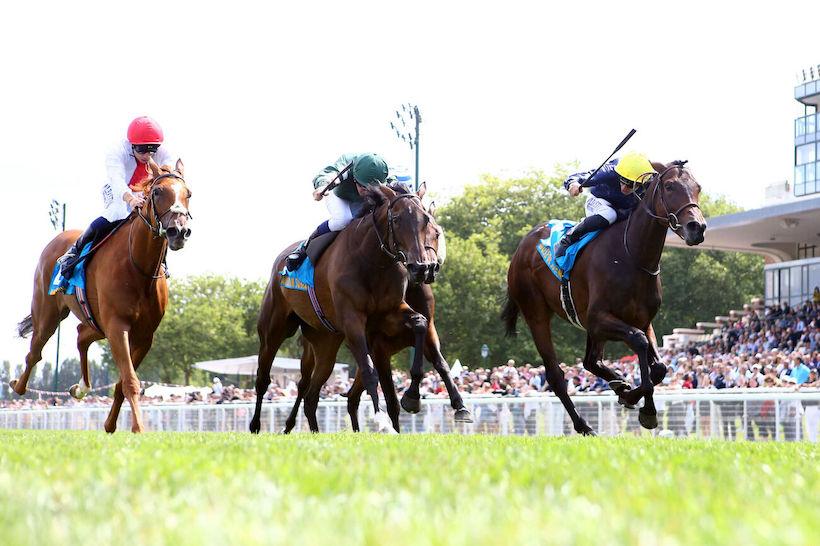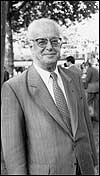Prix Jean Romanet History: A great man and an immediate hit

Photos scoopdyga.com, horseracingintfed.com
August, Deauville
DARLEY PRIX JEAN ROMANET
Group 1, 4-year-old and up Fillies & Mares, 2,000m/1m2f, €250,000
Created in 2004
Last winner: MQSE DE SEVIGNÉ (f5, IRE by Siyouni ex Penne, by Sèvres Rose), owned by Édouard de Rothschild, bred by Écurie de Meautry, trained by André Fabre, ridden by Alexis Pouchin.
Record-time: 2’04’’1, Ajman Princess (2017)
The race will be run in 2025 for the 22nd time.
The 2024 edition
Deauville, Sunday, August 18th, 2024 – The remarkable Mqse de Sevigné (Siyouni) etched her name further into Deauville racing history with a thrilling victory in the 2024 Sumbe Prix Jean Romanet (Gr1). The filly, already the only one to have captured both of Deauville's premier Group 1 races for fillies and mares - the Prix Rothschild (Gr1) over a mile and the €250,000 Sumbe Prix Jean Romanet (Gr1) over ten furlongs - repeated the feat this year, albeit by the narrowest of margins.
Homebred by Édouard de Rothschild, Mqse de Sevigné settled at the rear of field of five, led by the Irish raider American Sonja (Tasleet) and Left Sea (Frankel). The pace was not particularly strong, with the half-trip marker reached in 1'05.8. As the field turned for home, the defending champion made her move down the centre of the track, challenging American Sonja, who was the quickest to accelerate. Mqse de Sevigné appeared to have gained the upper hand, but her rival fought back valiantly, ultimately succumbing by just a head. A short neck further back was Maxux (Frankel), a stablemate of the runner-up from the Joseph O'Brien yard. Blue Rose Cen (Churchill), who had been locked in a battle with American Sonja for much of the straight, finished fourth, half a length behind, with Left Sea trailing 20 lengths behind.
This victory followed Mqse de Sevigné's second consecutive success in the Prix Rothschild, marking her fifth Group 1 triumph overall.
After breaking her maiden, Mqse de Sevigné won the Prix Vanteaux (Gr3) as a 3-year-old in 2022. Despite finishing ninth in the Poule d'Essai des Pouliches (French 1,000 Guineas, Gr1), she recorded the fourth-fastest final 3 furlongs in a messy race. Subsequently, her connections focused exclusively on races between ten and eleven furlongs, resulting in five second-place finishes in her last six starts over those distances. Supplemented for her return to a mile in the "Rothschild," she achieved an unprecedented double last year by also winning the Sumbe Prix Jean Romanet (Gr1), a feat she replicated here. In the autumn, she finished second to Inspiral in the Sun Chariot Stakes (Gr1) on her return to a mile and prepared for the Prix d'Ispahan by conceding weight to Skalleti in the Prix Jacques Laffitte (L).
Mqse de Sévigné is a sister to Méandre (Slickly), the Grand Prix de Paris (Gr1) winner. Méandre's full sister, Ondoyante (Slickly), a maiden at the time and 13 years old, was sold, barren, for €2,500 to Paul Nataf at the Arqana February 2022 Mixed Sale. Ondoyante has a 2020 filly by Saxon Warrior and a subsequent colt by Kodiac, Mr l’Apothicaire, who recently placed again in a maiden race.
History
This event was created in 2004 to restructure the European race card for 4-year-old mares. It serves as a trial for the Prix Vermeille in France, now open to fillies and mares aged three and over and contested three weeks later. The race’s name honours the memory of a prominent figure from the racing world. In 2009, the race was elevated to Group 1 status.
The race is, therefore, recent, but it was a resounding success from the outset, and its track record brings together some of the greatest European champions of the young century. Pride, Satwa Queen and Stacelita, for example, marked their time.
In 2023, Mqse de Sevigné won the two Gr1 contests of the Deauville meeting restricted to females, namely the Prix Rothschild and the Prix Jean Romanet. She did it again in 2024!
Foreign winners
Filles and mares trained in France lead 12-9 against their British and European rivals.
Jean Romanet (1914-2003)
 Jean Romanet devoted the majority of his life to the development of the Société d'Encouragement pour l'amélioration des races de chevaux en France (the precursor to France Galop), at both national and international levels.
Jean Romanet devoted the majority of his life to the development of the Société d'Encouragement pour l'amélioration des races de chevaux en France (the precursor to France Galop), at both national and international levels.
Born in December 1914, Jean Romanet was the son of René Romanet-Riondet, who served as general secretary of the Société d'Encouragement from 1925 to 1945 after succeeding his brother Maurice Romanet, who had held the post from 1915 to 1924.
Jean Romanet’s career began in 1938 as a senior civil servant at the Finance Ministry. In 1946, he was seconded to the finance committee of the Assemblée Nationale at the request of the rapporteur general, Charles Barrangé. He served there for fifteen years, assisting the committee’s different rapporteurs and chairmen, most notably Paul Reynaud and Pierre Mendès-France.
At the same time, Jean Romanet maintained a strong interest in racing, which he inherited from his family. A well-known figure in equestrian circles, he rapidly became the leading authority after the Second World War.
At the request of Marcel Boussac, he produced Racing and Breeding from 1947 to 1950, a magazine that was as glossy as it was informative. Under a pen name (N.E. Marot), he wrote highly regarded articles on breeding in Sport-Complet, which took over from Paris-Sport after the war and later merged with Paris-Turf. He contributed to the magazine Courses & Elevage from its launch in 1954 and, between 1945 and 1960, supplied the "Racing in France" section of the memorable English publication The Bloodstock Breeders' Review. He also provided numerous articles for the American weekly The Blood-Horse. Finally, like his father, he became a breeding advisor to Marcel Boussac. When the latter became chairman of the Société d'Encouragement in December 1959, he opted to entrust Jean Romanet with the day-to-day running of flat racing’s governing body. A civil servant "on secondment", Jean Romanet thus became the Société d'Encouragement’s general manager in March 1961, a post he occupied until 31 January 1986.
When, on 19 December 1985, the society’s then-chairman Hubert de Chaudenay announced Jean Romanet’s imminent retirement to the committee, he paid the following tribute to his esteemed colleague:
"Given the considerable role occupied by M. Jean Romanet within the institution, both in France and worldwide, you will not be surprised if I take a few moments to recall the main stages of his twenty-five years of activity among us.
"Made general manager by Chairman Boussac in 1961, his first task was to reform the structures of the Society, which had up until then been run in collegial form by the stewards, to create structures more in conformity with the possibilities of the committee members, whose own schedules made them less available than they had been in the past. Consequently, the current system under which we work was created.
"He then set up the common fund for breeding and racing and, always loyally and solidly supported by Chairman Boussac, brought order and method to the disorder that had previously reigned in allocating subsidies to the provincial bodies. He played an active role in the renovation of Longchamp in terms of design and completion. With the aid of the stewards, most notably the Duc de Noailles and Yann de Chevigny, he oversaw the development of Chantilly and created the Lamorlaye and Avilly training centres.
"In social terms, he presided over the setting-up of the Moulin à Vent educational centre and of Chantilly Hospital, the foundation for the action subsequently continued by the AGOSEC. At the sporting level, he helped develop the pattern races project, which, after being perfected by Weatherby, was adopted worldwide and permitted the internationalisation of the major events that had previously been made difficult or even impossible by the gap between the levels of races in different countries. Whatever objections might have been to his expansionist preoccupation and unpopular ideas on productivity and the virtues of budget control, he soldiered on intelligently and efficiently with management duties. It is courtesy of him and his immediate staff that we have succeeded in reducing by around 50% the number of staff needed to operate the Société. In international terms, he was also the creator of the international conference during which, on the day after the Prix de l’Arc de Triomphe each year, the developed countries teach others how to organise racing correctly and gradually establish the international rules currently adhered to by forty-four nations.
"Audacious in conception, bold and effective in execution, firm in his principles and passionate in defence of this institution, he has been, for me, an incomparable colleague during the eleven years of a chairmanship stirred up by the effects of political reforms and the turbulence of the economic crisis.
"But unfortunately, a prophet is never recognised in his fatherland! Some accused him of excessive harshness in expressing his thoughts, a common flaw among those who believe theirs is the sole truth and thus put real passion into what they do. I have never subscribed to this view of him, and the same goes for the many representatives of foreign countries who showered him with distinctions.
"In 1972, for example, he was awarded a CBE (Commander of the Order of the British Empire) by Her Majesty the Queen of England; in 1975, he received the Eclipse Award from the Thoroughbred Racing Association for his contribution to the international activity of thoroughbred horse races; in 1979, in Canada, he was presented with the Sovereign Awards Trophy; in 1982, the Derby Award was bestowed on him in Great Britain by the International Racing Bureau; and lastly, in the USA on 4 October this year, he was given the Jockey Club Medal in recognition of his contribution to the racing and breeding industry. France owes its place in international racing as much to Jean Romanet as to the quality of its horses."
However, Jean Romanet's semi-retirement was only a case of semi-retirement. He retained his chairmanship of the International Conference of Horseracing Authorities until 1993. Simultaneously, he passed on the family tradition of serving the horseracing world to the fourth generation of Romanets, namely his son Louis, who was general manager of France Galop until the end of 2007.
Owners
- Khalid Abdullah (2 wins): Announce (2011), Romantica (2013)
- Helena Springfield (2 wins): Izzi Top (2012), Speedy Boarding (2016)
- Steven & Gillian Lamprell (2 wins): Satwa Queen (2006, 2007).
- Edouard de Rothschild (2 wins): Mqse de Sevigné (2023, 2024).
Trainers
- André Fabre (4 wins): Announce (2011), Romantica (2013), Mqse de Sevigné (2023, 2024).
- James Fanshawe (3 wins): Ribbons (2014), Speedy Boarding (2016), Audarya (2020).
- Jean de Roualle (2 wins): Satwa Queen (2006, 2007).
- Alain de Royer Dupré (2 wins): Pride (2005), Alpine Rose (2009).
- John Gosden (2 wins): Izzi Top (2012), Coronet (2019).
Riders
- Lanfranco Dettori (3 wins): Folk Opera (2008), Ribbons (2014), Coronet (2019).
- Maxime Guyon (2 wins): Announce (2011), Romantica (2013).
- Thierry Thulliez (2 wins): Satwa Queen (2006, 2007).
- Alexis Pouchin (2 wins): Mqse de Sevigné (2023, 2024).